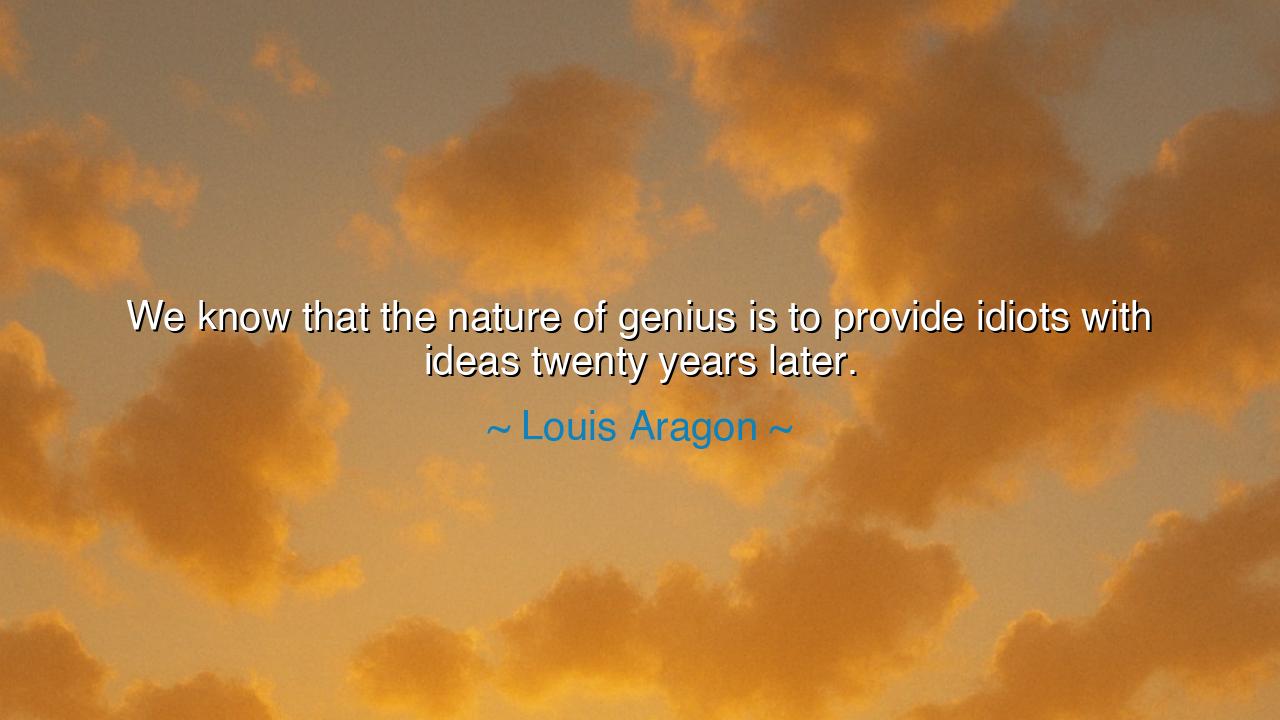
We know that the nature of genius is to provide idiots with ideas






"We know that the nature of genius is to provide idiots with ideas twenty years later." These words, spoken by Louis Aragon, offer a powerful reflection on the nature of genius, innovation, and how society often reacts to the new and unfamiliar. Aragon’s statement speaks to a profound truth about how groundbreaking ideas, when first presented, are often met with skepticism, resistance, or even derision. The genius who forges these ideas, whether in the realms of science, art, or philosophy, is often not celebrated in their time, but rather misunderstood. It is only after a significant passage of time, when the truth of their work becomes clearer, that society begins to acknowledge their wisdom and foresight.
In the ancient world, the stories of great innovators like Socrates, Archimedes, and Galileo serve as prime examples of how true genius is often misunderstood. Socrates, for instance, questioned the very foundation of Athenian society. He challenged its values and the way people viewed knowledge, yet his contemporaries saw him as a disruptive force. His ideas were not accepted during his lifetime; in fact, they led to his condemnation. It wasn’t until long after his death that Plato and other philosophers recognized the full depth of Socratic thought, which eventually became the cornerstone of Western philosophy. In many ways, Socrates embodies Aragon’s quote: a genius who provided ideas that took time to be understood and appreciated.
Similarly, Galileo Galilei, the Italian astronomer, faced fierce opposition for advocating the heliocentric model of the solar system. The church and many intellectuals of the time rejected his ideas, as they contradicted centuries of traditional belief. Yet, Galileo’s work laid the foundation for modern astronomy and physics, transforming our understanding of the universe. In his time, he was persecuted, but today, he is recognized as one of the greatest scientific minds in history. Once again, his genius was not fully understood until generations later.
These stories resonate with Aragon's insight into the nature of genius. Great thinkers, artists, and innovators often stand alone in their time, fighting for ideas that are ahead of their era. Leonardo da Vinci, for example, sketched out designs for flying machines and anatomical studies centuries before the necessary technology or understanding of the human body existed to realize these ideas. Da Vinci’s visionary genius was not fully appreciated in his own time, and many of his concepts remained unrealized until much later. Yet, his ideas became the foundation for scientific progress centuries after his death, proving that true genius is often ahead of its time and, initially, misunderstood by those who cannot yet grasp its implications.
In modern times, the story of Steve Jobs offers a similar narrative. Jobs, the co-founder of Apple, was often seen as a visionary who revolutionized personal computing and consumer technology. However, his ideas and innovative designs were met with resistance early on. The very concept of an all-in-one computer, or a smartphone that combined communication, computing, and entertainment, was unheard of when Jobs first began his work. The skepticism from critics and even from his own industry was intense. Yet today, Jobs is remembered as a genius whose ideas shaped the digital age. Like Galileo and Socrates, Jobs’ brilliance was not recognized by everyone at the time, but his legacy is one that changed the world.
Aragon’s quote, then, offers us a lesson about patience and perspective. It reminds us that true innovation often comes in waves that society is not ready to ride immediately. In the pursuit of progress, we must be willing to accept that greatness does not always come with immediate validation or applause. The genius of today may be seen as the fool of tomorrow, and only through the passage of time will their ideas be recognized for their true value. This is the essence of innovation—to see beyond the horizon of convention, to create something new, and to bear the weight of misunderstanding until the world catches up.
In practical terms, this means that we must cultivate a sense of resilience and courage when faced with the misunderstanding of our ideas. Whether we are inventing new technologies, artistic forms, or philosophical concepts, we must be prepared for the difficult journey of being misunderstood. This journey is part of the path of genius. We must learn not to be disheartened by criticism or skepticism but to continue moving forward with faith in the potential of our ideas. Time may not always be kind to those who innovate, but history often reveals their wisdom once the world is ready to embrace it.
The lesson here is clear: to innovate, to create, and to think differently requires not only vision but also patience and fortitude. Greatness is rarely recognized immediately. Instead, it is planted like a seed that may only bloom long after we are gone. Let us, then, embrace the challenge of being misunderstood and let us continue to pursue our ideas, knowing that time will eventually reveal their worth. In doing so, we become part of the grand tradition of genius that has shaped the world, from Socrates to Jobs, and from Galileo to da Vinci, whose ideas continue to live long after their creators.






AAdministratorAdministrator
Welcome, honored guests. Please leave a comment, we will respond soon